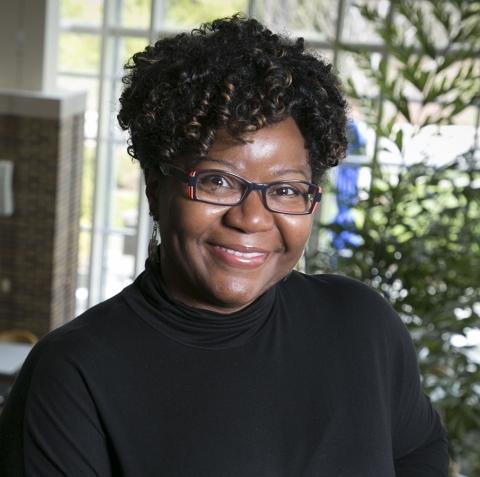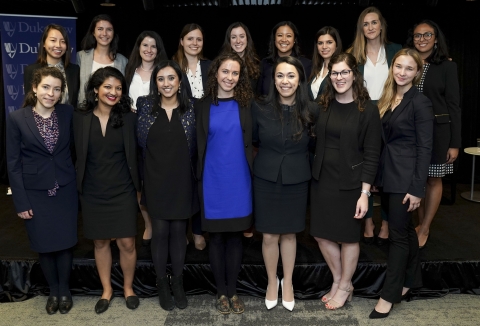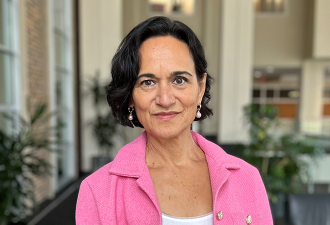Legal Theory and Critical Legal Studies
A legal education is a rigorous intellectual experience – in addition to learning how to think like a lawyer, you will also develop deep historical and theoretical understandings of the law and its development.
In addition to a solid grounding in substantive areas of law, Duke Law offers an array of opportunities to critically assess the role of law in society. Courses range from surveys of legal theory and explorations of legal philosophy, law and literature, and legal history, to intensive seminars on critical race theory and sexuality and law.
Although many students appreciate these theoretical courses because they bring a critical perspective to the study of law and their future careers as lawyers, some have focused intensely on scholarly writing during their time at Duke and gone on to illustrious careers in legal academia.

Trina Jones
Jerome M. Culp Professor of Law and Director, Center on Law, Race & Policy
Professor Trina Jones, who focuses her scholarly research and writing on racial, gender, and socioeconomic inequality, is a leading legal expert on colorism, which is the differential treatment of same-race individuals on the basis of skin color. Her current projects explore colorism from a comparative perspective and consider the interplay between DNA-based ancestry tests and racial identity. In response to the reckoning with systemic racism in the nation's past and present, she co-developed and co-taught a Race and the Law seminar and speaker series "to offer a vehicle through which students might place 2020 in a larger historical frame and through which they might consider the role of law in struggles for racial justice," she said.
More Faculty
370 Modes of Legal Argument
The course will be organized around a set of essential questions, all vital to the ways we argue about the law. The major schools of legal and constitutional interpretation will be explored. For example, we will discuss formalism and textualism, purposivism, originalism, process theory, economic analysis, realism and legal pluralism. Each of these theories has an answer to the question, what is the right way to interpret a legal text? Beyond the text, what modes, or forms of argument are permissible, or mandatory, within our legal tradition? But each of those inquiries depends on deeper questions. Where does law come from? What, if anything, makes it legitimate? It will also deal with some concrete examples in which those modes of legal argument are tested and deployed: Does the law create the market economy, or is there a pre-existing template for market economies that frames and limit the interpretation of the laws that govern those markets? The public/private distinction is central to a liberal society: do we have a consistent or principled way of interpreting those boundaries? How should our understanding of law be affected by the fact that we live in a democratic country, a free-market country, a country with a written constitution? We will consider and approach these questions by way of major schools of legal thought, testing the theoretical approaches against concrete problems the legal system has had to address, and the shapes these problems take today.
473 Scholarly Writing Workshop
In a workshop led by a faculty member, students will produce an original analytic paper of substantial length (ordinarily at least 30 pages). Papers must involve significant and thorough independent research, be well-written, and provide appropriate sourcing. Participants are free to choose any topic that may be addressed seriously in an article-length piece and that may be written during one semester. Papers produced in the workshop are expected to satisfy the JD or LLM substantial research and writing project requirement.
In the workshop, participants will learn about the conventional features of academic legal writing, conduct research into and hone their topics, write and give each other feedback on first and second drafts, and complete a final draft of their paper. The faculty member leading the workshop will also provide feedback and will, as appropriate to each participant's paper topic, facilitate introductions to other faculty who may be of assistance.
504 Critical Race Theory
Critical race theory (CRT), a scholarly movement that began in the 1980s, challenges both the substance and style of conventional legal scholarship. Substantively, critical race scholars (“race crits”) reject formal equality, individual rights, and color-blind approaches to solving legal problems. Stylistically, race crits often employ new methodologies for legal scholarship, including storytelling and narrative. This course introduces CRT’s core principles and explores its possibilities and limitations. With a heavy focus on writings that shaped the movement, the course will examine the following concepts and theories: storytelling, interest convergence theory, the social construction of race, the black-white paradigm, the myth of the model minority, intersectionality, essentialism, working identity, covering, whiteness and white privilege, colorblindness, microaggressions, and implicit bias. Students will apply these theories and frameworks to cases and topics dealing with, among other things, first amendment freedoms, affirmative action, employment discrimination, and criminal disparities and inequities. The course affords students an opportunity to think about the ways in which racism, sexism, classism, and heterosexism are inextricably interwoven as well as an opportunity to challenge critically our most basic assumptions about race, law, and justice.
718 Social Choice Theory: Cost-Benefit Analysis and Beyond
Social choice theory is the systematic study of how to combine individual preferences, or some other indicator of individual well-being, into a collective ranking. Although scholars have worried about this problem for centuries, most intellectual progress in social choice theory has occurred in the last century, with Arrow's stunning "impossibility theorem," and the development of the notion of the "social welfare function." This latter construct serves as the foundation for many disciplines within economics (such as optimal tax theory or the economics of climate change). It also provides a rigorous and comprehensive framework for thinking about cost-benefit analysis--currently the dominant policy tool in the U.S. government.
This course will provide an introduction to social choice theory, with a particular focus on the social welfare function and on cost-benefit analysis. In the course of addressing these topics, we will also spend substantial time discussing the philosophical literatures on well-being and on inequality. What is the connection between someone's well-being and her preferences, her happiness, or her realization of various "objective goods"? And--on any conception of well-being--how should we structure policy choice to take account of the distribution of individual welfare? Addressing these questions is essential for thinking clearly about collective choice and, in particular, social welfare functions and cost-benefit analysis.
753 Law and Literature: Race & Gender
This seminar explores the intersection between literary and legal studies, with a particular focus on race and gender. Through literature and some film, the seminar examines the role of law in the structure of conflict, personal relationships, social hierarchy and social change, with attention to privilege, perspective, and voice. Possible authors include Margaret Atwood, James Baldwin, Octavia Butler, Ava DuVernay, Lorraine Hansberry, Ursula Hegi, Kazuo Ishiguro, Nella Larsen, Gabriel García Márquez, Toni Morrison, Colson Whitehead, and Richard Wright.
370 Modes of Legal Argument
The course will be organized around a set of essential questions, all vital to the ways we argue about the law. The major schools of legal and constitutional interpretation will be explored. For example, we will discuss formalism and textualism, purposivism, originalism, process theory, economic analysis, realism and legal pluralism. Each of these theories has an answer to the question, what is the right way to interpret a legal text? Beyond the text, what modes, or forms of argument are permissible, or mandatory, within our legal tradition? But each of those inquiries depends on deeper questions. Where does law come from? What, if anything, makes it legitimate? It will also deal with some concrete examples in which those modes of legal argument are tested and deployed: Does the law create the market economy, or is there a pre-existing template for market economies that frames and limit the interpretation of the laws that govern those markets? The public/private distinction is central to a liberal society: do we have a consistent or principled way of interpreting those boundaries? How should our understanding of law be affected by the fact that we live in a democratic country, a free-market country, a country with a written constitution? We will consider and approach these questions by way of major schools of legal thought, testing the theoretical approaches against concrete problems the legal system has had to address, and the shapes these problems take today.
473 Scholarly Writing Workshop
In a workshop led by a faculty member, students will produce an original analytic paper of substantial length (ordinarily at least 30 pages). Papers must involve significant and thorough independent research, be well-written, and provide appropriate sourcing. Participants are free to choose any topic that may be addressed seriously in an article-length piece and that may be written during one semester. Papers produced in the workshop are expected to satisfy the JD or LLM substantial research and writing project requirement.
In the workshop, participants will learn about the conventional features of academic legal writing, conduct research into and hone their topics, write and give each other feedback on first and second drafts, and complete a final draft of their paper. The faculty member leading the workshop will also provide feedback and will, as appropriate to each participant's paper topic, facilitate introductions to other faculty who may be of assistance.
504 Critical Race Theory
Critical race theory (CRT), a scholarly movement that began in the 1980s, challenges both the substance and style of conventional legal scholarship. Substantively, critical race scholars (“race crits”) reject formal equality, individual rights, and color-blind approaches to solving legal problems. Stylistically, race crits often employ new methodologies for legal scholarship, including storytelling and narrative. This course introduces CRT’s core principles and explores its possibilities and limitations. With a heavy focus on writings that shaped the movement, the course will examine the following concepts and theories: storytelling, interest convergence theory, the social construction of race, the black-white paradigm, the myth of the model minority, intersectionality, essentialism, working identity, covering, whiteness and white privilege, colorblindness, microaggressions, and implicit bias. Students will apply these theories and frameworks to cases and topics dealing with, among other things, first amendment freedoms, affirmative action, employment discrimination, and criminal disparities and inequities. The course affords students an opportunity to think about the ways in which racism, sexism, classism, and heterosexism are inextricably interwoven as well as an opportunity to challenge critically our most basic assumptions about race, law, and justice.
718 Social Choice Theory: Cost-Benefit Analysis and Beyond
Social choice theory is the systematic study of how to combine individual preferences, or some other indicator of individual well-being, into a collective ranking. Although scholars have worried about this problem for centuries, most intellectual progress in social choice theory has occurred in the last century, with Arrow's stunning "impossibility theorem," and the development of the notion of the "social welfare function." This latter construct serves as the foundation for many disciplines within economics (such as optimal tax theory or the economics of climate change). It also provides a rigorous and comprehensive framework for thinking about cost-benefit analysis--currently the dominant policy tool in the U.S. government.
This course will provide an introduction to social choice theory, with a particular focus on the social welfare function and on cost-benefit analysis. In the course of addressing these topics, we will also spend substantial time discussing the philosophical literatures on well-being and on inequality. What is the connection between someone's well-being and her preferences, her happiness, or her realization of various "objective goods"? And--on any conception of well-being--how should we structure policy choice to take account of the distribution of individual welfare? Addressing these questions is essential for thinking clearly about collective choice and, in particular, social welfare functions and cost-benefit analysis.
753 Law and Literature: Race & Gender
This seminar explores the intersection between literary and legal studies, with a particular focus on race and gender. Through literature and some film, the seminar examines the role of law in the structure of conflict, personal relationships, social hierarchy and social change, with attention to privilege, perspective, and voice. Possible authors include Margaret Atwood, James Baldwin, Octavia Butler, Ava DuVernay, Lorraine Hansberry, Ursula Hegi, Kazuo Ishiguro, Nella Larsen, Gabriel García Márquez, Toni Morrison, Colson Whitehead, and Richard Wright.
Race and the 1L Curriculum
A yearlong series at Duke Law sponsored by the dean’s office examined race in the context of the six foundational subjects in the first-year curriculum: torts, criminal law, civil procedure, contracts, property law, and constitutional law. Each discussion in the “Race and the 1L Curriculum” webinar series was moderated by a faculty scholar who teaches a first-year course in the area of law under consideration. The events featured scholars and others engaged in research and legal actions that address racial disparities in the way these bodies of law are taught or formulated, or how they play out in practice.

Women & Law
On the centennial of the ratification of 19th Amendment, women occupied the editor-in-chief position of the flagship law journals at the 16 top-ranked law schools in America. To commemorate the historical moment, Duke hosted a daylong conference in Washington, D.C., that was attended by all but one of the editors, prominent scholars and practitioners, the deans of the Chicago, NYU, Virginia, Duke, and UCLA law schools, and Supreme Court Justice Ruth Bader Ginsburg. The 16 EICs also collaborated on a special joint publication called Women & Law, a collection of 14 essays by prominent women in the legal community.


















